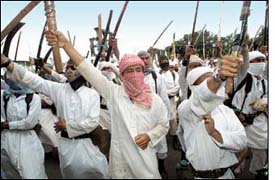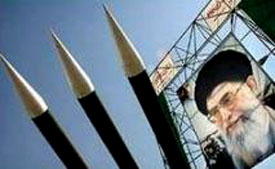 |
International Affairs
The World after a U.S. Surrender in Iraq
Toby Westerman
American combat troops are once again being betrayed as they serve their country, and America will pay dearly for its political shortsightedness.
The Bush administration entered into Iraq with the intent of making Iraq a symbol of freedom in a region of the world plagued by autocrats and fanaticism. Militant Islam was and remains determined to make that country into a center of fundamentalist Muslim terror.
Since the November 2006 elections, U.S. troops in Iraq have been facing an enemy that knows that all that is necessary is to wait out the Americans. The terrorists know that every U.S. casualty they inflict will be magnified by the U.S. press and will further increase demands for a quick exit from Iraq.

An American defeat in Iraq signifies victory
for the jihadists ...

and feeds the challenge of countries like Iran
|
The criterion for an American withdrawal should be nothing less than a non-fundamentalist Iraqi government. Anything less will be a betrayal of the American forces who fought, bled, and, in some cases, died. As in Vietnam, our troops have not been defeated on the battlefield, but politicians at home have lost the will to do the job.
The cold truth is that no one knows the degree of harm that will be done to America, if there is even the appearance of an American defeat.
The world has changed substantially since the 1970s, when America last abandoned those whom it said it would support. Unlike the situation after the Vietnam war, America will not be able to retreat behind its nuclear shield and lick its wounds. We will not be given that time. America's enemies will quickly begin to close in on a nation perceived as too weak for a prolonged fight.
America will be shocked not only that the Iraq war will be brought to the U.S. homeland, but also by the number and variety of enemies arising to challenge it.
The United States has usually taken Latin America for granted, but new leaders have recently appeared in that region who are openly hostile to the U.S. and very friendly to America's enemies, including the forces of terror. China is set not merely to challenge the United States in Asia and the Pacific, but even in outer space. Beijing's successful anti-satellite missile test is a stark reminder that China is aiming for nothing less than superpower status. Russia and China are even planning on a joint colony on the moon.
There is the call, especially from members of the Democratic Party, to open talks and negotiate with those hostile to us. Unless we remain strong and have the respect of those who are nevertheless hostile to us, any negotiations will be nothing more than the discussion of terms of the surrender.
To face these challenges, America will need a strong and confident military, but will U.S. politicians have already destroyed our armed forces? If America leaves Iraq in haste and fear, it will be a proud, professional military that will most severely feel the sting of defeat and humiliation. No one knows how America's professional armed force will react to military failure caused by political lack of will or foresight. America cannot afford to have its military succumb to either anger or despair.
A retreat - or perceived retreat - from Iraq will have devastating consequences for the United States. We may find ourselves tested to the limit. America must rediscover its pride, strength, and purpose. May God guide us.

Posted January 30, 2007
Toby Westerman writes and edits
International News Analysis - Today
An investigative, analytical, and uncompromising weekly analysis of the world situation
Contact T. Westerman at www.inatoday.com
or P.O. BOX 5182, Rockford, ILL, 61125-0182
This article was published in the
January 29, 2007 online edition of INA Today
|
International Affairs | Hot Topics | Home | Books | CDs | Search | Contact Us | Donate

© 2002- Tradition in Action, Inc. All Rights
Reserved
|
 |
|